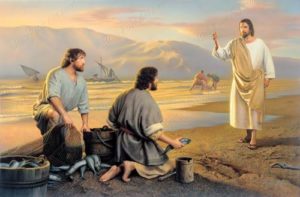Isaiah 8:23-9:3; 1 Cor 1:10-13.17; Mt 4:12-23.
 The people who lived in darkness have seen a great light; on those who dwelt in darkness and the shadow of death, a light has dawned. These beautiful words came from the mouth of Isaiah. St. Matthew sees them as fulfilled in Jesus. Jesus’ coming was like the dawning of great light. Indeed this was how Jesus described his mission when he said: “I am the light of the world”.
The people who lived in darkness have seen a great light; on those who dwelt in darkness and the shadow of death, a light has dawned. These beautiful words came from the mouth of Isaiah. St. Matthew sees them as fulfilled in Jesus. Jesus’ coming was like the dawning of great light. Indeed this was how Jesus described his mission when he said: “I am the light of the world”.
The territory occupied by the tribes of Zebulun and Naphtali (later known as Galilee) was the most northerly part of Israel. Because it bothered on the pagan territory, it would have been associated with darkness. It was the first province of Israel to be conquered by Assyria in 732 BC. Isaiah predicted a future liberation for the people of that region. In his Gospel, Matthew sees that prophecy as fulfilled in Jesus.
Normally, light is something we welcome. However, in certain circumstances, we might fear it because it shows up everything; things we want to be shown or seen and things we would rather prefer to hide from others and even from ourselves sometimes. Matthew compares the arrival of Jesus on the scene to the coming of great light to a people who have been living in deep darkness. He saw Jesus fulfilling the great prophecy of Isaiah: the people who lived in darkness have seen a great light; on those who dwell in the land and shadow of death, a great light has dawned.
Mother Theresa gives us a beautiful example of a man who was brought out of darkness into the light. One day in Melbourne, Australia, she visited a poor man whom nobody knew existed. The room in which he was living was in a terrible state of untidiness and neglect. There was no light in that room. The man hardly ever opened the blinds. He lived alone. He had no friend in the whole wide world.
Mother Theresa started to clean and tidy the room. At first, he protested, saying, ‘leave it alone. It’s all right as it is’. But Mother Theresa went ahead anyway. Under a pile of rubbish, she found a beautiful oil lamp but it was covered with dust. She cleaned and polished it. Then she asked him, ‘How come you never light this lamp?’ Why would I light it? he replied. No one ever comes to see me. I never see anybody. Will you promise to light it if one of my sisters comes to see you? Yes, he replied. If I hear a human voice, I will light the lamp. Two of Mother Theresa’s Nuns began to visit him regularly. Things gradually improved for him. Then one day, he said to the Nuns, ‘Sisters, I will be able to manage on my own from now on. But do me a favour. Tell that first sister who came to see me that the light she lit in my life is still burning.
At first, he didn’t like the light. He felt threatened by it. It made him uncomfortable. Why? Because it showed up the misery in which he was living; first of all, the physical misery, then the misery of the spirit. But gradually he came to see it as a friend which comforted him and brought hope into his dark existence. This he slowly turned his life around. The light had saved him. Of course, it wasn’t the lamp itself that had done this, but the kindness and goodness it symbolized, first in mother Theresa, then in her sisters.
To appreciate the light, one must be conscious of one’s darkness and desire to escape from it. One must realize one’s need to change, and want to change. Before people seek redemption, things must go badly for them. They must have experienced the darkness of sorrow and disappointment. Then they are ripe for the light of salvation. This is why Jesus began his teaching with the message: ‘Repent, for the kingdom of heaven is close at hand’. To repent is to admit the darkness in which we are living and to open ourselves to light. This repentance is shown in a new way of living. To be saved is to have come out of darkness into the light.
Each of us has areas of darkness in our lives, fear, illness, pain, sin, guilt, loneliness, and so on. The society too has its dark areas. Hence our need for the light of Christ. Though the light comes as a friend, it is also disturbing because it shows up what is hidden and what is wrong. There still are many people who live in darkness and the shadow of death. We need the lamp of Jesus now more than ever. Fortunately, the light that Jesus lit continues to burn, glowing goodness that illuminates the world. It burns in the life of his followers [like mother Theresa’s sisters].
Each of us can be sources of light to our darkened world. Indeed each of us is called to that task. There is joy in being in the light and there is even greater joy in being a source of light to others.




Be the first to comment